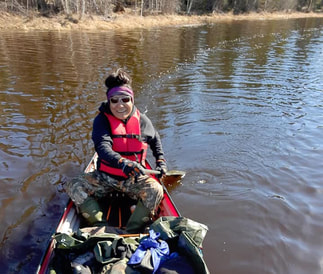 Bernice Marlowe joined the Thaidene Nëné team in early June. One of her first responsibilities as the new Ni Hat’ni Dene coordinator was to support the youth canoe trip to K’áı́hųká Tué (McLean Bay). The youth were also accompanied by traditional knowledge instructors, Sandra and James Lockhart. While on the trip, Bernice had a moment of déjà vu. “I realized James and Sandra had taught me stuff like this when I was in school, and they’re still teaching me,” she exclaims. “Who would have thought that I would have been doing this?” Young Bernice may not have anticipated becoming the Ni Hat’ni Dene coordinator—she had her heart set on being a geologist—but she would have welcomed the opportunity to spend time in the bush as part of her job. Born and raised in Łutsël K’é, when Bernice and her siblings weren’t in school, they were out on the land. she recalls, “My late dad, George Marlowe, was a big role model for me, being out on the land. He always took me out. He taught me the way of life, and bush skills.” Both of their parents, George and Celine, had day jobs in the community, so the Marlowe girls and their brother, Darren, also spent time in the bush, learning from their maternal grandparents, Marie and Bruno Nataway, and their uncles. When Bernice had kids—she and her partner, Paul Catholique, have three sons: Troy, Tyson, and Nuni—they were trained in the same way. Bernice says, “My late Dad took my boys out on the land as much as possible, right up until he couldn’t be mobile anymore. He showed them what he taught me.” A plane crash at Utsingi Point in 2011 left Bernice unable to work. “For a long time,” she explains, “I was in this mode from my plane crash. I was staying in my room all the time.” In addition to support from her mom, Paul, sister Amanda, and other family, spending time on the land was an important part of Bernice’s healing journey. She says, “Every time I went out on the land, I felt more like I could breathe. I felt safe.” Bernice was living next to the Thaidene Nëné offices while she was recovering. “I realized that I wanted to work for the department. I said to my mom: How do I get a job there? And she said, ‘Picture in your head what you want to do. Picture it in your head and repeat it everyday.’” Celine’s advice must have worked, because Bernice is now responsible for coordinating the activities for the Ni Hat’ni Dene program and managing the guardians. “What I like about my job,” she explains, “is being able to take care of the guys because they are our guardians. I like to make sure they are well-equipped for every season. I also like being able to work with the young people, show them the way of life, and share bush skills and knowledge.” For Bernice, Thaidene Nëné means “land watchers, guardians. The people who take care of our land, who protect our land.” She thinks of her children and the other young people in the community when asked why it is important to protect the land: “It’s because of our kids, our kids’ kids, the next generation and the generation after that.” Bernice wants to ensure that future generations are able to live and travel on the land the way her grandparents did, the way that she has been able to do. “Travelling and harvesting,” she says, “that is our lifestyle. I don’t know what would happen if we weren’t able to do that.” As much as Bernice is thinking about future generations, she also feels a responsibility to those of long ago: “This land is where my ancestors were at one time. It was passed down to me that it is my duty to protect it.” Bernice feels a special connection to Ts’ąkuı Theda (Parry Falls), a place that grounds her, and also to Ɂedacho Tłaze (Timber Bay). “Every time I go up there, she says, “I get so emotional. I cry with happiness when I arrive, and then I cry when it’s time to go because I have to leave. Part of me is up there. I feel at home when I’m there. It’s been that way ever since I was a little girl.” But there are lots of places in the Thaidene Nëné Indigenous Protected Area that are new to Bernice, and she looks forward to visiting them in her role as the Ni Hat’ni Dene coordinator. Comments are closed.
|
AuthorWrite something about yourself. No need to be fancy, just an overview. Archives
July 2024
Categories |
CONNECT |
VISIONWe are the Lutsel K’e Dene First Nation. Our vision for Thaidene Nëné is:
Nuwe néné, nuwe ch'anıé yunedhé xa (Our land, our culture for the future). We’re working with our partners to permanently protect Thaidene Nëné—part of our huge and bountiful homeland around and beyond the East Arm of Tu Nedhé. |
